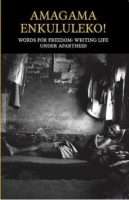Miriam, not knowing where to start, looked wearily around the house at her duties for the day. Washing lay on the bedroom floor ready for the automatic washing machine. Dishes were piled high in the kitchen sink indicating that a good time was had by all at Madam’s party. After she had served dinner to the guests last night, she had left the kitchen at about nine o’clock. Most nights she would spend with her friend who worked across the road. They would talk about their families, their Madams and everything that affected their lives. Last night, however, Miriam had felt too tired and just fell asleep in her tiny room. This morning she was back in the big house to do the cleaning up!
Today her heart felt heavy in her breast. She was nervous and had dropped things. Already she had broken a porcelain figurine when she was dusting. Tonight she would have to face the consequences. All she could do, as was usual after such a confrontation, was to return to the lonely maid’s room in the back yard, and sulk.
She carried a transistor radio from room to room while doing her chores. She was listening expectantly for news of the worsening unrest in the townships. And it was a special day because of the call to march to Pollsmoor Prison to demand the release of Nelson Mandela. Why could she not be with her family and her people at a time like this? Instead she was compelled to spend her time cleaning for the rich and unconcerned.
At eleven-thirty she heard those special bleeps on the radio which preceded the news. Anxiously she turned up the sound for the urgent news flash. The police had taken over Athlone and the march on Pollsmoor had been put to an abrupt end! The police had used batons, quirts and teargas. There were many injured and detained.
Miriam stood stunned and shocked because some of the reported incidents had taken place near her home. After a while she decided that it would be best to return to the township where she lived to where she felt that she would be needed by her family and neighbours. She filled the dog’s water bowl, kicked the washing into a corner, locked all the doors, and left the big house in a hurry.
As she locked the gate she remembered that Madam would certainly telephone that afternoon to enquire, as she usually did, about what she would be cooking for supper that night. Now that was the least of her worries – she was on her way home!
She walked as quickly as her ungainly, tired body could carry her. She turned into Paradise Road which was lined with tall green oak trees; birds flew about, and squirrels with their frenetic bushy tails jumped along the branches. The avenue, so peaceful with its beautiful spring-green trees stretching almost as far as the eye could see, was just like some fabled Eden.
Almost breathless she arrived at the Claremont bus terminus and was just in time for a departing bus to her township. She had little time to waste as she had to return to her work before the white family arrived home that night. She sat down resolutely in a vacant seat at the window. As she stared out she thought about her husband, Amos. Yes, together they had been through hard times bringing up their three children; both working to make ends meet until three months ago when he was brought home in one of the construction company’s trucks. The driver had to carry him inside the house! He had been employed by the company for ten years. Yet the day he injured himself the foreman said that he was too busy to fill in the compensation forms! Until now he had received just two weeks’ pay and a pair of crutches.
These thoughts made her angry and, given the opportunity, she would have walked in the front row of that march! But she could not stay at home as she needed the job so badly. The family depended on the hundred-and-twenty rand a month which she earned as a maid. She thought about her daughter Winnie, the other breadwinner of the family. She worked at Groote Schuur Hospital as a trainee nurse. Every month Winnie would bring home her pay packet unopened. Miriam was very proud of her and loved her very much.
Her two sons were now both at high school. Ah, how she adored them! They never complained and were always satisfied. They wore patched pants and their shoes were often down at heel but they never missed school. She really admired them and their dedication to their studies.
Steve was now in his final matriculation year and her baby, Fassie, now sixteen, was in Standard Eight. They were both so bright that she smiled as she thought about them. They would have joined the march that morning as they were supporters of the People’s United Front. She remembered how her boys insisted on taking her to the mass political rally at the skating rink in Athlone. She had never seen such a crowd in her life! All were meeting for the struggle for freedom.The speeches were fiery and pertinent about the oppressive laws of her country. She had felt pleased that her sons had brought her to the rally.


